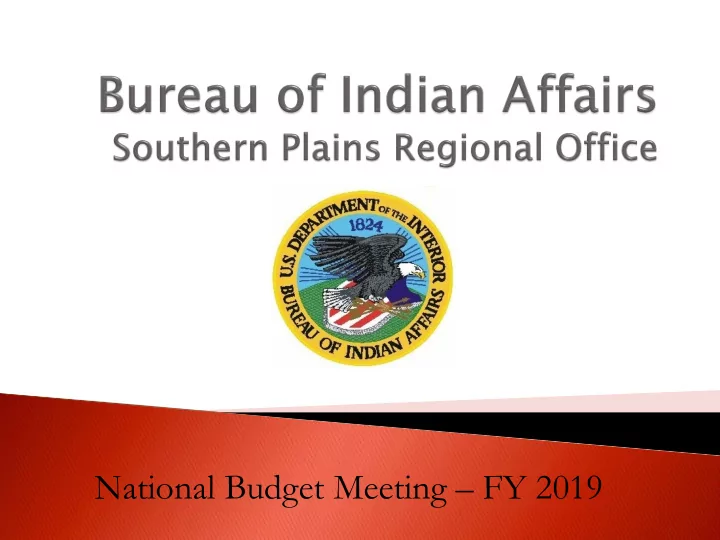

National Budget Meeting – FY 2019
Total Agencies\Field Offices: 5 Total Tribes: 24 Total Reservations: 20 Total Acres: 479,015.38 Total Tribal Enrollment: 119,327 Total Programs Funded: 41 Total Employees: 225
CHEYENNE & ARAPAHO KIOWA KAW COMANCHE OTOE-MISSOURIA APACHE PAWNEE IOWA TRIBE OF KS & NE FT. SILL APACHE PONCA KICKAPOO TRIBE IN KS CADDO TONKAWA PRAIRIE BAND POTAWATOMI DELAWARE SAC & FOX OF MO WICHITA & AFFILIATED ALABAMA-COUSHATTA TRIBE OF TX ABSENTEE-SHAWNEE KICKAPOO TRADITIONAL TRIBE OF TX CITIZEN POTAWATOMI IOWA TRIBE OF OK KICKAPOO TRIBE OF OK SAC & FOX NATION OF OK
Southern Plains Region 8% Increase = $41.22 M Top 3 Priorities & Requested Increases (Millions) TRIBA IBAL P PRIO IORIT ITY P PROGRAM 2016 16 2019 19 TOTAL AL ENACTE CTED INCR NCREASE SE REQUESTE STED Scholarships & Adult Education $2.39 $15.46 $17.85 Social Services $1.99 $12.88 $14.87 Indian Child Welfare $1.07 $12.88 $13.95
Issues regarding Education continue to remain the same: ◦ Rising tuition costs ◦ Increase # students applying for Scholarships/AE ◦ Not enough tribal funding to support students ◦ Students are forced to take out student loans or drop out altogether In the state of Oklahoma, the average cost for tuition (excluding fees and other costs) for a full-time undergraduate student in 2016-17 school year was almost $5,000. At that rate and at the current enacted funding level for this program within the SP Region, only 0.4% (500) of the region's current tribal members (119,327) would receive one year's worth of tuition only.
Increased funding is needed to meet the pressing Indian educational needs beyond the elementary and secondary levels ◦ Request of $17,85 Million will: Provide up to$2,500 per student Serve estimated 7,140 Indian students provide 6% of current regional tribal enrollment with opportunity to offset cost of HE ◦ 24 Tribal communities will benefit when tribal members use acquired education/skills to strengthen tribal economies and meet specific community needs within the Southern Plains Region.
Issues for Indian Child Welfare Programs remain the same: ◦ Requirements of federal, state and tribal laws involve an immense amount of time and attention; ◦ Result has been an increased caseload and associated responsibilities to tribes without increasing necessary resources; The enacted funding for the Southern Plains Region in 2016 was $1.067 Million, averaging $44,458 for each of the 24 tribes in the region. This amount does not fully fund the salary of even ONE case worker.
Increase in funds are needed for tribes to hire and train adequate staff and to reduce the staff to client ratio; ◦ Our Request is an additional $12.88 Million to serve 2,040 more ICW cases To Adequately operate one ICWA office staffing one employee =$109,543; X 24 tribes = $2.63 Million Increase ICW case workers: 5 staff x 24 tribes= 120 case workers x $28.15/hr @ 2,080 hrs + $11,527 fringe =$8.41 Million; Provide $900 per ICW case for case management costs: 2,040 clients x $900 = $1.84 24 Tribal communities within the Southern Plains Region will benefit by an increase in funding, which will: ◦ allow tribes to hire and train an adequate number of staff thereby reducing the client to staff ratio (120 workers x 17 clients =2040) ◦ expand capabilities to further intervene in involuntary court proceedings. ◦ allow tribal ICW office to operate more effectively to fulfill its supportive, supplemental and substitute care services.
Issues for Social Services create unhealthy tribal communities: Tribal Social Workers manage caseloads that are double ◦ and sometimes triple the national standard of the client to staff ratio (15:1); ◦ High unemployment rates increase the need for extended services for many clients; ◦ Limited resources reduces the amount of assistance to needy families The enacted funding for the Southern Plains Region in 2016 was $1.99 Million, averaging $83,000 for each of the 24 tribes in the region. This amount may fund salary/fringe and barely equip ONE Social Worker.
Increase in funding is needed to reduce the client to staff ratio ◦ Request additional $12.88 Million to serve 1440 elderly, women, children and families Additional 4 Social Workers x 24 tribes = 96 $134,200 (salary, fringe, vehicle, fuel, program supplies, laptop) x 96 = $12.88 Million 24 Tribal communities within the Southern Plains Region will benefit by an increase in funding, which will: ◦ Add 96 Social Workers x 15 cases = 1440 clients ◦ Support youth and family through the Tiwahe Initiative ◦ Increase delivery of services and financial assistance ◦ Provide funding to purchase program vehicles to reduce the need to use personal vehicles when performing official staff duties
Emergency Management: Tribes looking for resources to respond to emergencies\natural and man-made disasters other than FEMA; Fracking activities: believed to be linked to increased earthquakes in Oklahoma; JOM: Need accurate student count and increasing JOM assistance which is currently at $66.00 per student; Adult Education: Revision in regulations that disqualify Indian students living in non-service areas
Discretionary vs. Mandatory: How to approach Congress & Senate on declaring tribe’s funding mandatory; TPA: How can funding levels (formulas) be re- evaluated to address Tribal Unmet Needs; Sequestration/Permanent Budget Cuts: ◦ Sequestered funds should be restored at the tribal level as a first priority; ◦ Requiring tribes to pay for the federal government’s shortfall by reducing funds and services to tribes is not an acceptable solution;
The approximate number of students the Cheyenne and Arapaho Higher Education Scholarship Program assists per academic year The percent increase of tribal members who received higher education assistance from the Citizen Potawatomi Nation in the Fall, 2016 Number of students served over the last 5 years by the Pawnee Nation’s Education Division BIA funding is supplemented with gaming or other tribal funding to support these Scholarships and Adult Education programs.
Thank you!
Recommend
More recommend